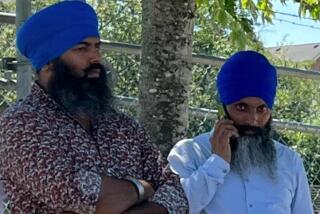U.S. officials said to be pushing for the removal of Iraq’s leader

WATCH VIDEO: President Obama said he is ready to send up to 300 U.S. military advisors to Iraq to help its embattled government, which is fighting insurgents who have seized up to a third of the country.
U.S. officials are actively pushing for the removal of Iraqi Prime Minister Nouri Maliki and have held meetings with senior politicians who are angling to replace the embattled leader, according to Iraqi officials and a report Thursday.
The U.S. ambassador to Baghdad, Robert S. Beecroft, and a senior State Department official, Brett McGurk, met this week with former Iraqi exile leader Ahmad Chalabi and parliament speaker Usama Nujaifi, as well as other possible candidates to replace Maliki.
The Shiite Muslim prime minister has seen large chunks of Iraq seized in recent days by Sunni militants fighting under the banner of the Islamic State of Iraq and Syria, an Al Qaeda splinter group.
Beecroft and McGurk met with Chalabi, a Shiite, at his house in Baghdad’s Mansour neighborhood for more than an hour Wednesday, said a Chalabi aide, Entifadh Qanbar. They discussed “the current security escalations and future formations of the government,” Qanbar said. He declined to elaborate.
The meetings, first reported by the New York Times, are the clearest signal yet that the Obama administration has decided Maliki must step down after the rapid gains by ISIS militants.
Maliki has been widely accused of running a Shiite dictatorship, marginalizing minority Sunnis and ethnic Kurds. The recent violence, along with a call to arms by the leading Shiite cleric, Grand Ayatollah Ali Sistani, has raised fear that Iraq could lapse back into the sectarian bloodletting of the mid-2000s.
President Obama said last week that U.S. military assistance to Maliki’s government would be contingent on him building a more inclusive government.
He announced Thursday that the United States is prepared to send as many as 300 military advisors to Iraq to help government forces fend off the Islamic militants, but urged the country’s leaders to seek a political resolution to the crisis.
On Capitol Hill, a growing number of lawmakers are also beginning to call for leadership change.
“The Maliki government, candidly, has got to go if you want any reconciliation,” Sen. Dianne Feinstein (D-Calif.), chairwoman of the Senate Intelligence Committee, said at a hearing Wednesday.
Meanwhile, there were reports of fresh fighting Thursday as Iraq’s government and the insurgents vied for control of the country’s largest oil refinery.
Authorities insisted that their forces successfully fought off an attack on the refinery in Baiji, about 125 miles north of Baghdad, a key link in Iraq’s energy chain. But other reports indicated that militants had not been completely expelled from the sprawling facility. Smoke was seen billowing from the complex, according to various accounts.
Losing the Baiji facility would be a strategic and symbolic blow for the government, which is trying to project an image of regrouping after a series of humiliating military defeats. The power outages and gasoline shortages that would result from losing the refinery could further sap public confidence in the nation’s shaky central government.
Seizing the refinery would also be an economic coup for the militants, who have captured oil fields in eastern Syria.
Many diplomats fear that Iraq could be on the verge of disintegration or the kind of all-out civil war that has ravaged neighboring Syria.
The conflict also appears to have aggravated already tense relations between Saudi Arabia, the major Sunni power in the Persian Gulf region, and Shiite Iran, which is a close ally of Maliki’s government.
The two regional powers are engaged in a proxy battle in Syria and appear to be lining up on different sides in the Iraqi conflict. The Iranian government has pledged to do whatever it takes to protect Shiite shrines in Iraq under threat from Sunni militants.
On Thursday, Saudi Foreign Minister Prince Saud al Faisal said at a news conference in Jeddah that Iraq risks falling into a civil war “with unpredictable consequences for the region.”
The Iraqi government has accused Saudi Arabia of providing financial and moral support to the Sunni militants.
But the Saudi foreign minister put the blame squarely on Maliki, saying his “sectarian policies of exclusion” of Iraq’s Sunni minority population had precipitated the crisis.
“He accuses the kingdom that it is the sponsor of terrorism,” Saud said. “This accusation is ridiculous.... Maliki’s sectarian policies are the reason for the deterioration of the situation in Iraq.”
Times staff writer Bengali reported from Baghdad and special correspondent Bulos from Irbil, Iraq. Times staff writer Patrick J. McDonnell in Beirut contributed to this report.
For more news from Iraq, follow @SBengali and @mcdneville.
More to Read
Sign up for Essential California
The most important California stories and recommendations in your inbox every morning.
You may occasionally receive promotional content from the Los Angeles Times.









